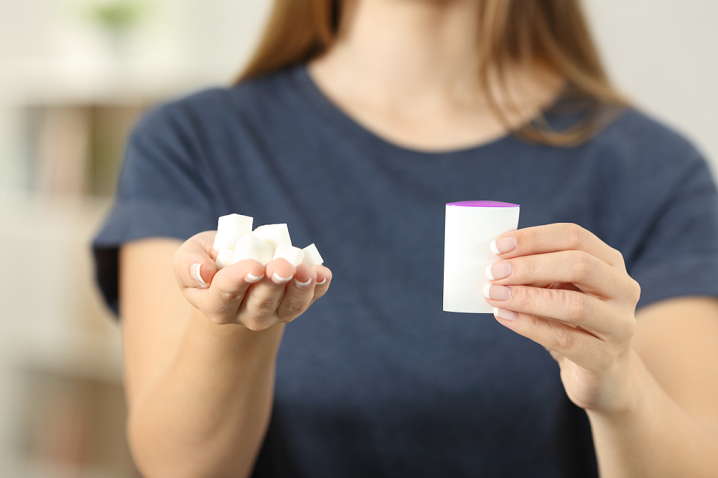Artificial or non-nutritive sweeteners are substances that add a sweet flavor to foods and drinks but have low-calories or no-calories as compared to sugar, corn syrup or fruit juice concentrates. Aspartame, sucralose, acesulfame potassium, neotame, and saccharin are examples of artificial sweeteners. Because of their no or low-calorie nutrient value, They are a popular choice among people struggling with obesity, metabolic syndrome, diabetes and those looking to reduce sugar intake. However, using artificial sweeteners are not the magic answer and a one-stop shop for solutions to these health challenges. Using them intelligently can help individuals to reduce added sugars in their diets, thus, correspondingly reducing the number of calories they consume. A reduction in the calories consumed can translate into helping individuals attain their healthy body weight and maintain it, in turn, lowering their risk for diabetes and heart disease.
Saccharin, acesulfame, aspartame, neotame, and sucralose are five commonly used artificial sweeteners whose use is approved by the food and medical industries. However, the manner in which the human body and brain respond to them is very complex. One example is in the manner in which individuals may rationalize their choice of having something unhealthy because they are having another item with artificial sweetener. For example, “I’m drinking tea with artificial sweetener, so I can have the halwa/jalebi/samosa.” This happens because it is a human tendency to fool ourselves. In this manner, many people replace the lost calories through other foods, contradicting the advantages of using artificial sweeteners in the first place. Many nutrition, health, and medical professionals add this warning to their recommendations about using artificial sweeteners.
Artificial sweeteners may also change the way food tastes. This is because a miniscule amount of these sweeteners produce a much sweeter taste than regular sugar or corn syrup but without the calories. Over time, regular users of artificial sweeteners may develop an intolerance for more complex tastes due to overstimulation of their sugar receptors caused by frequent use of artificial sweeteners. This can cause them to find less sweet foods, like fruits, less pleasing and non-sweet foods, such as vegetables, disgusting. This can cause the users of artificial sweeteners to avoid healthy, filling, nutritious foods.
Therefore, artificial sweeteners for diabetics in India, though good for health, should be used carefully and in moderation.























Add comment